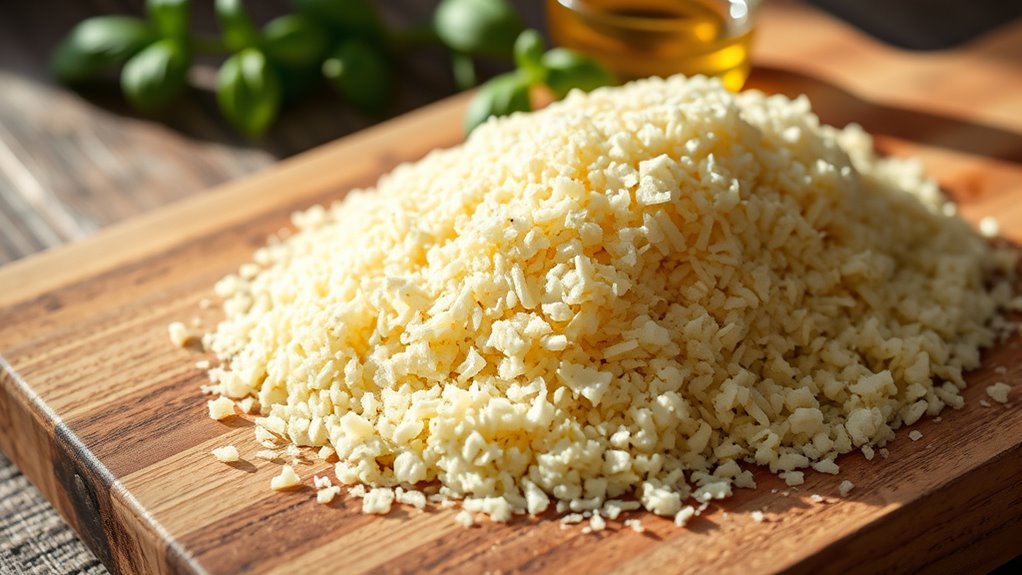Yes, Parmesan cheese is keto-friendly due to its low carb content, with less than 1 gram of carbs per ounce and about 8-10 grams of protein. This makes it a great option for enhancing your low-carb meals without spiking your carb intake. Keep in mind portion control, as larger servings can add up. Plus, you can enjoy its unique flavors in various dishes. You’ll discover more about incorporating Parmesan into your keto lifestyle as you explore further.
Nutritional Profile of Parmesan Cheese

Parmesan cheese is a popular choice for those following a keto diet, thanks to its impressive nutritional profile. With low carbs and high protein content, it can fit seamlessly into your meals. There are various parmesan varieties, each offering unique flavors and textures, but they generally share similar nutritional benefits. For instance, a typical serving has around 8 grams of protein and just 1 gram of carbs, making it an excellent option for your keto lifestyle. To maintain the quality of your cheese, proper cheese storage is essential. Wrap it in parchment paper and keep it in the fridge to prevent spoilage. This way, you can enjoy the rich and savory taste of parmesan while sticking to your dietary goals.
Carbohydrate Content in Parmesan

When considering Parmesan cheese as part of a keto diet, it’s essential to look at its carbohydrate content. Typically, a one-ounce serving contains less than a gram of carbs, making it a favorable choice for those monitoring their carb intake. Comparing this to other cheeses can help you understand how Parmesan fits into your overall nutritional goals. Additionally, Parmesan is low in carbs and high in fat, making it an excellent option for supporting a successful keto lifestyle.
Nutritional Breakdown Overview
Cheese lovers can rejoice, as Parmesan is a low-carb option that fits well within a ketogenic diet. With its rich flavor and versatility, it’s no wonder that various parmesan varieties are popular among health-conscious individuals. Typically, a serving of grated Parmesan contains about 1 gram of carbohydrates, making it an excellent choice for your keto meals. When incorporating Parmesan into your diet, proper cheese storage is essential to maintain its freshness and flavor. Keep it in an airtight container in the fridge, and it’ll last longer, allowing you to enjoy its nutty taste without worrying about excess carbs. So, go ahead and sprinkle it on your dishes without straying from your keto goals!
Carb Count Comparison
While exploring low-carb options, you’ll find that Parmesan stands out due to its remarkably low carbohydrate content. This makes it an excellent choice for those following a ketogenic diet. Here’s how Parmesan compares to other carb sources:
- Parmesan: Approximately 1 gram of carbs per tablespoon.
- Cheddar Cheese: About 0.4 grams of carbs per tablespoon.
- Mozzarella: Roughly 1 gram of carbs per tablespoon.
When considering keto alternatives, Parmesan’s low carb count allows you to enjoy its rich flavor without jeopardizing your dietary goals. Incorporating it into your meals can enhance taste while keeping carb intake minimal. Additionally, most cheeses, including Parmesan, fit well within the low carbohydrate count of a ketogenic diet. So, if you’re looking for satisfying, low-carb options, Parmesan is a fantastic addition to your pantry.
Serving Size Impact
Although Parmesan is low in carbohydrates, the serving size you choose can greatly influence your overall carb intake. A typical serving size of Parmesan cheese is about one ounce, containing roughly 1 gram of carbs. If you enjoy larger portions, it’s easy to exceed your carb limits, especially if you’re following a strict keto diet. Portion control is essential; by measuring your cheese, you can enjoy its rich flavor without derailing your nutritional goals. Keeping track of your serving size allows you to savor Parmesan while staying within your desired carb range. Additionally, understanding the carb content of other cheeses can help you make informed choices about your diet. So, whether you sprinkle it on salads or mix it into dishes, be mindful of how much you use to maintain your keto lifestyle effectively.
Comparing Parmesan With Other Cheeses

When comparing Parmesan with other cheeses, you’ll notice significant differences in their nutritional profiles, particularly in carbohydrate content. Parmesan typically has lower carbs than many soft cheeses, making it a popular choice for keto diets. Additionally, the flavor and texture of Parmesan stand out, offering a sharper taste and a firmer consistency that can enhance various dishes. Additionally, Parmesan is a good source of calcium and protein, which are essential nutrients for maintaining a healthy keto lifestyle.
Nutritional Profile Comparison
As you explore the nutritional profiles of various cheeses, Parmesan stands out due to its unique blend of flavor and health benefits. Here’s how it compares to some popular parmesan alternatives:
- Protein Content: Parmesan boasts about 10 grams of protein per ounce, higher than many soft cheeses.
- Calcium Source: It offers a significant calcium boost, with roughly 30% of your daily requirement in just one ounce.
- Fat Composition: Parmesan is lower in carbs and contains healthy fats, making it a solid choice for keto diets. Additionally, its low carb content aligns well with keto dietary guidelines, helping maintain ketosis.
When considering cheese nutrition, Parmesan’s impressive profile makes it a top contender among cheeses, especially if you’re looking for a satisfying, low-carb option. Enjoying it in moderation can fit perfectly into your dietary freedom.
Carb Content Analysis
Parmesan’s lower carbohydrate content further enhances its appeal for those following a keto diet. Typically, most parmesan varieties contain about 1 gram of carbs per ounce, making them an excellent choice for anyone looking to minimize carb intake. In comparison, other popular cheeses, like mozzarella and cheddar, can have slightly higher carbohydrate counts, ranging from 1 to 2 grams per ounce. This slight difference may seem insignificant, but it can add up, especially for those adhering to strict keto guidelines. The keto benefits of choosing parmesan include not just its low carb content but also its rich flavor, allowing you to enjoy your meals without compromising your dietary goals. Additionally, parmesan is known for its nutrient density, providing essential vitamins and minerals that can support overall health. So, if you’re aiming for a keto-friendly lifestyle, parmesan can fit seamlessly into your plan.
Flavor and Texture Differences
While many cheeses can enhance dishes, the distinct flavor and texture of parmesan set it apart from its counterparts. Its rich umami flavor adds depth to your meals, making it a favorite among cheese lovers. Here are three key differences you might notice:
- Umami Flavor: Parmesan boasts a stronger umami profile compared to milder cheeses like mozzarella or ricotta, elevating the overall taste of dishes.
- Texture Profiles: The granular, crystalline texture of parmesan contrasts with the creaminess of cheeses like Brie, providing a unique mouthfeel.
- Aging: Aged parmesan develops complex flavors that younger cheeses often lack, offering a depth that can enhance both savory and sweet dishes.
Incorporating parmesan into your meals brings both flavor and character, making it a standout choice.
Health Benefits of Parmesan on a Keto Diet
Incorporating Parmesan into your keto diet can offer several health benefits, especially given its low carbohydrate content and high protein levels. This cheese is rich in calcium, supporting bone health and muscle function, which is essential when you’re consuming fewer carbs. The high protein content can aid in satiety, helping you feel fuller longer and potentially reducing cravings. Plus, Parmesan contains beneficial nutrients like vitamin A and zinc, which support immune function. With its low lactose levels, those with lactose intolerance may also enjoy it without discomfort. These keto advantages make Parmesan a strong choice for adding flavor and nutrition to your meals while maintaining your dietary goals. Enjoying it mindfully can enhance both taste and health.
How to Incorporate Parmesan Into Keto Meals
If you’re looking to enhance your keto meals, adding Parmesan can be a game-changer. This versatile cheese not only boosts flavor but also fits perfectly into your low-carb lifestyle. Here are three ways to incorporate Parmesan:
- Keto Snacks: Create Parmesan crisps by baking thinly grated cheese until golden and crunchy. They make for a delightful, low-carb snack.
- Salads: Sprinkle freshly grated Parmesan over your salads for added richness and texture, complementing your greens beautifully.
- Parmesan Recipes: Use it in sauces or casseroles to elevate the dish while keeping carb counts low.
With these ideas, you’ll enjoy delicious meals while sticking to your keto diet, allowing you to savor every bite without guilt.
Possible Downsides of Eating Parmesan
While Parmesan can be a tasty addition to your keto meals, it’s important to reflect on some potential downsides. Its high sodium content may not sit well with everyone, especially those watching their salt intake. Additionally, if you’re lactose intolerant or concerned about caloric density, you might want to consume it in moderation.
High Sodium Content
Although Parmesan cheese is a popular choice for those following a keto diet due to its low carbohydrate content, it’s important to reflect on its high sodium levels. Consuming too much sodium can have significant health implications, especially for those with sodium sensitivity. Here are three key points to contemplate:
- Blood Pressure: High sodium intake can lead to increased blood pressure, potentially affecting cardiovascular health.
- Fluid Retention: Excess sodium may cause your body to retain water, resulting in discomfort and bloating.
- Kidney Function: Over time, a high-sodium diet can strain your kidneys, impacting their ability to filter waste effectively.
Being mindful of your Parmesan consumption can help you enjoy its flavor while maintaining your health. Balance is key!
Lactose Intolerance Issues
Enjoying Parmesan cheese can pose challenges for those who are lactose intolerant. While Parmesan is lower in lactose than many other cheeses, it still contains enough to trigger lactose sensitivity symptoms in some individuals. Symptoms can include bloating, gas, and abdominal pain, which can disrupt your enjoyment of meals. If you find that Parmesan doesn’t sit well with you, consider exploring cheese alternatives like lactose-free cheese or plant-based options. These alternatives can offer a similar taste experience without the discomfort. It’s important to listen to your body and choose what works best for you. Remember, enjoying a keto lifestyle doesn’t have to mean sacrificing flavor; there are plenty of delicious options available that fit your dietary preferences.
Caloric Density Concerns
When evaluating Parmesan as part of a keto diet, it is important to keep in mind its caloric density. While this cheese can be a tasty addition, it’s essential to monitor your caloric intake to support your weight management goals. Here are three key points to reflect on:
- High-Calorie Count: Parmesan is calorie-dense, which means it packs a lot of calories into a small serving.
- Portion Control: It’s easy to overindulge, so keep an eye on serving sizes to avoid excess calories.
- Balance Your Meals: Incorporate Parmesan mindfully with other low-calorie, nutrient-dense foods. Additionally, be sure to pair it with low-carb vegetables to maximize nutritional value while staying within your carb limits.
Lactose Intolerance and Parmesan
For those with lactose intolerance, Parmesan cheese can be a surprisingly viable option. Unlike many other dairy products, aged Parmesan contains very low levels of lactose, making it suitable for individuals with lactose sensitivity. The aging process reduces lactose considerably, often allowing those with mild digestive issues to enjoy it without discomfort. Studies suggest that hard cheeses like Parmesan are easier to digest, providing an excellent source of protein and calcium without the typical lactose-related problems associated with softer cheeses. However, everyone’s tolerance varies, so you should start with small amounts to gauge your reaction. Embracing Parmesan in moderation can enhance your diet while keeping your lactose intolerance in check. Additionally, Parmesan’s high-fat content aligns well with the keto diet, making it a great option for those following this lifestyle.
Different Types of Parmesan Cheese
Parmesan cheese comes in various types, each with distinct characteristics, flavors, and uses. Understanding these Parmesan varieties can help you choose the right cheese for your meals.
- Parmigiano-Reggiano: This is the authentic Italian version, known for its granular texture and rich, nutty flavor. It’s often considered the gold standard.
- Grana Padano: A slightly milder and creamier Parmesan alternative that’s also Italian, but made with different regulations.
- American Parmesan: Produced in the U.S., this type may lack the depth of flavor found in imported options, but it’s often more accessible.
If you’re looking for Parmesan substitutes, consider Pecorino Romano or aged Gouda, which can provide unique flavors while keeping your dishes interesting.
Recipes Featuring Parmesan for Keto Dieters
Although many cheese options can fit into a keto diet, Parmesan stands out due to its low carbohydrate content and rich flavor, making it a versatile ingredient for various recipes. You can whip up a delicious Parmesan crusted chicken by coating chicken breasts in a mixture of Parmesan cheese and herbs before baking. This creates a crispy, savory outer layer that’s satisfying and keto-friendly. For a quick snack or appetizer, try a creamy Parmesan dip made with sour cream, garlic, and a sprinkle of Parmesan. Serve it with fresh veggies for a crisp, crunchy treat. These options not only satisfy your cravings but also keep you aligned with your keto goals, allowing you to enjoy flavorful meals without sacrificing your dietary preferences. Additionally, incorporating keto-friendly foods into your meals can enhance your overall dining experience while maintaining your low-carb lifestyle.
Final Thoughts on Parmesan in a Keto Lifestyle
When considering your keto lifestyle, incorporating Parmesan cheese can be a smart choice due to its low carb content and high protein levels. However, it’s important to keep a few things in mind:
- Health Considerations: While Parmesan is nutritious, it’s also high in sodium. If you have high blood pressure or other health concerns, monitor your intake.
- Moderation Tips: Enjoy Parmesan in moderation to avoid excess calories. A little can go a long way in flavoring dishes.
- Variety Matters: Balance your diet with other low-carb foods to guarantee you’re getting a range of nutrients. Additionally, consider pairing Parmesan with low-carb vegetables to enhance both flavor and nutrition.
Frequently Asked Questions
Is Parmesan Cheese Suitable for a Dairy-Free Keto Diet?
Parmesan cheese isn’t suitable for a dairy-free keto diet since it contains dairy. However, you can explore dairy-free alternatives like nutritional yeast or cashew-based cheeses, which offer a similar flavor profile and provide some nutritional benefits, like B vitamins and healthy fats. These options allow you to enjoy your meals without compromising your dietary goals. Just make sure to check the carb content to keep it in line with your keto needs.
Can I Eat Parmesan While Following a Vegan Keto Plan?
You can’t eat Parmesan on a vegan keto plan since it’s a dairy product. However, you can explore alternatives like vegan cheese made from nuts or soy, which can fit into your diet. Nutritional yeast is another great option; it adds a cheesy flavor and is low in carbs. Just verify any substitutes you choose are low in carbohydrates to maintain your keto goals while enjoying that cheesy taste you crave.
How Much Parmesan Can I Consume Daily on Keto?
You can typically consume about 1 to 2 ounces of Parmesan daily on a keto diet, depending on your overall daily intake of carbs and fats. This cheese is low in carbs, making it a popular choice. However, if you’re looking for cheese alternatives, consider options like nutritional yeast or vegan cheeses to maintain variety in your diet. Just remember to track your macros to guarantee you stay within your keto goals!
Does Cooking Parmesan Affect Its Keto Compatibility?
Cooking Parmesan doesn’t greatly affect its keto compatibility. Most cooking methods, like baking or sautéing, retain the cheese’s low carbohydrate content and healthy fats. However, high heat for prolonged periods can lead to some nutrient loss. Overall, you can enjoy cooked Parmesan while maintaining its keto benefits. Just remember to watch portion sizes, as it’s easy to consume more than intended when melted and mixed into dishes. Enjoy the freedom of incorporating it into your meals!
Are There Any Keto-Friendly Substitutes for Parmesan Cheese?
If you’re seeking keto-friendly substitutes for Parmesan cheese, consider nutritional yeast for its cheesy flavor and B vitamins, or pecorino Romano for a similar texture and taste. Both options provide flavor alternatives while keeping your carb count low. You might also try a mix of almond flour and nutritional yeast for a homemade blend. Each choice offers unique nutritional benefits, allowing you to enjoy your meals without compromising your keto lifestyle.
References
- https://www.healthline.com/nutrition/keto-diet-foods#dairy
- https://www.ncbi.nlm.nih.gov/pmc/articles/PMC6470879/
- https://www.webmd.com/diet/obesity/what-is-the-keto-diet
- https://www.hopkinsmedicine.org/health/wellness-and-prevention/what-is-the-keto-diet
- https://www.cdc.gov/healthyweight/assessing/bmi/adult_bmi/english_bmi_calculator/bmi_calculator.html
- https://www.medicalnewstoday.com/articles/323008#dairy-products
- https://en.wikipedia.org/wiki/Parmesan#Nutrition
- https://www.verywellfit.com/keto-diet-foods-5219150


